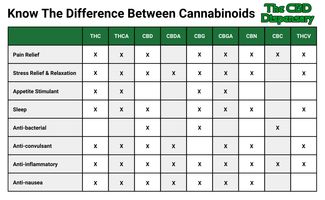Get To Know Cannabinoids
A breakdown of different elements of hemp and how it can affect the body

What is Hemp?
Effects vary based on contents of cannabinoids
The hemp plant is the "sister" species of the cannabis plant. Hemp is also known as “Cannabis sativa plant”. The most significant difference between the two is that the hemp plant has lower levels of delta-9-tetrahydrocannabinol (THC) and higher levels of Cannabidiol (CBD). Hemp is used for many things including textiles, skincare, and culinary additives. Fun fact: Hemp is a plant that grows quickly and absorbs carbon dioxide from the atmosphere, which can help mitigate climate change.
What is CBD?
Non-Psychoactive | Anti-Anxiety
Cannabidiol (CBD) is the “medicinal” chemical naturally occurring in both cannabis (marijuana) and hemp. Through years of research, CBD has been shown to have significant health benefits. Some of the more notable benefits include: Anxiety reduction, insomnia and chronic pain.
CBD is non psychoactive, meaning it does not cause the user to become impaired. Average dosing for an adult is roughly 25-35 mg twice a day. This is a base dose, as every body is different. The human body has an endocannabinoid system (ECS) which is a complex cell signaling system that helps regulate body functions. CBD feeds into the ECS and this is where the health benefits come into play.
What is CBC?
Non-Psychoactive | Relaxing
Cannabichromene (CBC) is one of the cannabinoids most commonly found in the hemp plant. CBC is best known for its aid in inflammation. CBC is non psychoactive meaning it will not intoxicate or impair the user. CBC will have a stronger effect when mixed with other cannabinoids, like CBD or THC. Through research, it has been found that CBC can aid in depression and anxiety, pain and inflammation, tumor growth, neurological conditions and acne.
What is CBG?
Non-Psychoactive | Anti-Inflammatory
Cannabigerol (CBG) is a cannabinoid found in cannabis plants. It is often referred to as a "minor cannabinoid" because it's typically present in smaller amounts compared to more well-known cannabinoids like THC (tetrahydrocannabinol) and CBD (cannabidiol). CBG is non psychoactive, meaning it will not intoxicate the user. Research on CBG is still emerging, but some studies suggest it may have various potential health benefits, including: anti inflammatory properties, neuroprotective effects, antibacterial properties, and appetite regulation
What is Delta-8?
Psychoactive | Body
Delta-8 tetrahydrocannabinol is a psychoactive substance found in the hemp plant. It is produced naturally by the cannabis plant but is not found in significant amounts in the cannabis plant. As a result, concentrated amounts of delta-8 THC are typically manufactured from hemp-derived cannabidiol (CBD). Since Delta-8 is psychoactive, it does cause the user to feel intoxicated. Delta-8’s effects are slightly milder than Delta-9. The chemical makeup of Delta-8 is Similar to Delta-9, with the exception of 2 molecules. This makes Delta-8 a better option for those prone to those who suffer cannabis related paranoia and anxiety.
What is HHC?
Psychoactive | Less Potent
HHC is the hydrogenated form of THC, found in hemp. HHC is formed through a process called hydrogenation, where hydrogen atoms are added to the THC molecule. HHC is reported to have similar effects to THC, but it's often described as being less potent and with a different psychoactive profile. Users report feelings of euphoria, relaxation and increased appetite.
What is THC-P?
Psychoactive | Highly Potent
Delta-9-tetrahydrocannabiphoral (THC-P) is a form of THC and is found in very little concentrations in cannabis. THC-P is thought to be roughly 33x stronger than Delta-9. Because of its strength it is thought that THC-P would be a better option for those needing higher concentrations of THC to aid in pain relief. THC-P is psychoactive and therefore will intoxicate the user. Higher doses of THC-P can have a sedative effect.
What is Delta-9?
Psychoactive | Traditional
Delta-9 is one of the best known forms of THC and is the most studied. Delta-9 is psychoactive, meaning it will intoxicate the user. Delta-9 is the most common form of THC found in both the cannabis and hemp plants.
What is THC-H?
Psychoactive | Pain Relief
THC-H, or tetrahydrocannabinol-C contains 6 carbon atoms, compared to THC which only has 5. THC-H exhibits potent psychoactive properties, meaning it will intoxicate the user. It has been shown to attach to cannabinoid receptors with 10% greater affinity than regular THC. Reports showed THC-H helped block the physiological detection of pain and has proven effective with dealing with pain management. Following THC-P, THC-H is the second most potent cannabinoid.
What is CB9/CB9a?
Psychoactive | Varied Potency
CB9, also known as Cannabidiol-9 or CBD-9, is a less commonly discussed cannabinoid related to cannabidiol (CBD) and tetrahydrocannabinol (THC). CB9 is psychoactive similar to THC. Its creation comes from CBD isolate. CB9 does not crystallize which makes for a smooth and enjoyable experience. CB9 on its own is not very potent but when adding acetate, it turns into CB9a - increasing its potency tenfold. CB9a interacts with the ECS by binding tightly to the CB1 & CB2 receptors. It is known to provide relief from arthritis, IBS, other inflammatory disorders, anxiety, depression and protects nerve cells from damage.
